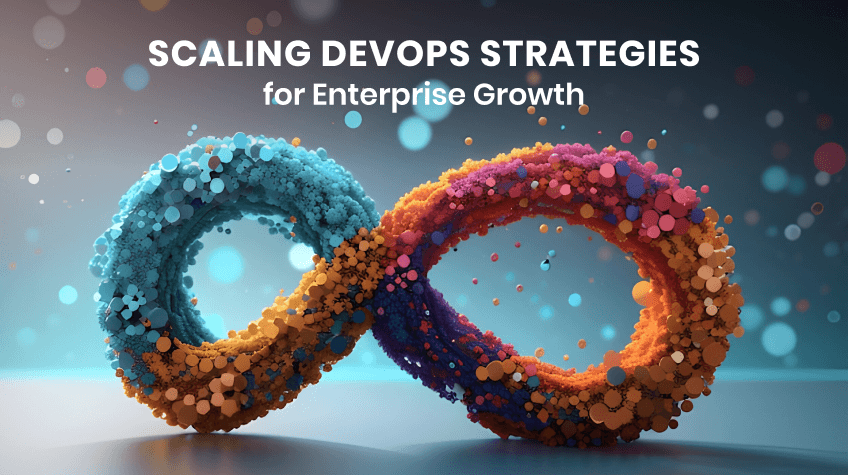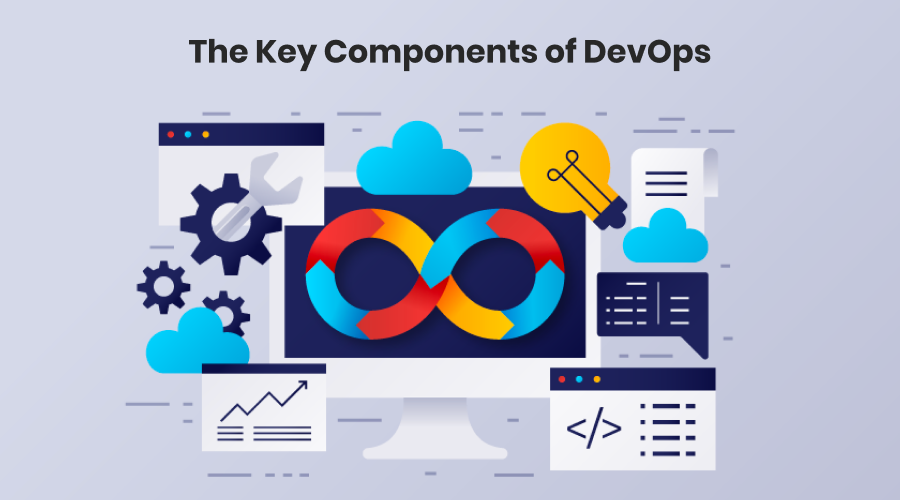
DevOps is a game-changer for software delivery, merging development and operations into a seamless flow. DevOps Strategies relies on automated tools for frequent code integration, testing, and deployment, ensuring swift fixes and updates with high quality. Imagine a smooth pipeline where code seamlessly flows from developers to users, powered by collaboration and real-time feedback. That’s DevOps in a nutshell!
What is DevOps?
DevOps is a software development methodology that combines Software Development (Dev) and Operations (Ops). DevOps functions as a system that provides a structure to continue a smooth operation.
DevOps follows an Agile methodology approach to software development. It is a combination of philosophies and practices that gives more importance to collaboration and iteration.
DevOps highlights efficiency through communication.
The Key Components of DevOps
DevOps is like a well-oiled machine, bringing development and operations together in a symphony of collaboration and automation. At its core, it’s about integrating code changes frequently, catching bugs early with automated testing, and deploying updates lightning fast.

Let’s find the key components of DevOps that guides the workflow of DevOps:
i. Collaboration
DevOps comprises multiple technologies and their developers at one stage. Collaboration and communication play a key role in ensuring everyone is on the same page. The collaboration includes continuous efforts between cross-functional teams. The teams include developers, QA analysts, operations, and software security. Effective communication channels and real-time interactions can happen through chatbots.
ii. Automation
Automation streamlines the development process. It reduces the need for manual interference and relies heavily on the machines resulting in reducing the error ratio. DevOps includes multiple automation methods that increase the speed and reduce the cost of development. Continuous testing and automation implementation helps to fix the errors quickly.
iii. Continuous Iteration
Continuous iteration is a process where code is changed continuously for better and faster outcomes. The central hub can have a primary code update so all the developers at every department can access the updated version of the code. Iteration is important to fix issues and enhance the development quality for users. Continuous iteration includes keeping up-to-date software and being aware of new code changes.
iv. Fast Delivery
DevOps developers focus on providing rapid delivery for the project’s betterment. The faster delivery can be finishing the project, updating features, fixing bugs, or adding new services. Faster delivery allows the software lifecycle to be updated quickly. Fast delivery helps to quickly adapt to the market change and develop accordingly. The ability to deliver quickly provides a significant advantage.
v. Monitoring
DevOps developers continuously monitor and improve the code. Continuous monitoring helps to focus on user experience and make informed decisions in the decision-making process. Monitoring considers the overall health of the application and improves it continuously. Real-time monitoring and comprehensive coverage help to track the health of the application.
vi. Infrastructure
Infrastructure also functions as a code. This can be network, virtual machines, and automated processes. The infrastructure is created keeping user needs in mind. IoC (Infrastructure as a code) automates setup, configuration, and management infrastructure. Cloud DevOps services emphasize automation and monitoring and become part of an infrastructure.
vii. Security
Including security measures is an important part of the DevOps process. Also known as DevSecOps this step ensures there is a foundation level of security kept from the bottom level. Security serves as a shared responsibility and not the liability of the security team only. This promotes a shared culture for betterment and progress of every team.
Why to Scale DevOps for Business Growth
As the size of the company grows, so does the need to increase resources and create a philosophy that is being accepted and followed by everyone. There are multiple reasons why scaling DevOps Strategies can be beneficial for an organisation.
i. Increasing growth
To cope with the increasing growth of the company it is essential that the complexity of software is managed. Every team of the company has to be working in such a way that the same wavelength is matched across the organisation.
ii. Enhanced Efficiency
DevOps transformation can Promote communication and dialogue between teams and developers leading to enhanced efficiency. It can increase quick communication between teams for faster decision-making processes beating traditional methodologies.
iii. Stay ahead of the competition
The technology world is always updating new tech and methods to provide a better user experience and increase revenue. To stay ahead and beat the competition, it is important to implement new technology beforehand.
Benefits of scaling DevOps for Business Growth
i. Increased Deployment
Scaling DevOps Strategies to a greater scale can help to increase development efficiency. This leads to faster and more reliable development and reduced time period.
ii. Improved Recovery
Robust practice can help to improve the recovery time. Failures are common when it comes to development, improving recovery can help to reduce the failure period and become more agile.
iii. Higher Quality of Development
Communication and collaboration can lead to higher-quality products. Iteration and adaptations become part of the process once DevOps is scaled to a higher level.
iv. Better Resource Management
Scaling DevOps can make an efficient use of resources spread across the organization. Automation can help overcome manual work and increase the capacity of individuals through a central process.
Also Read: Significant Benefits of DevOps for Business Growth
Challenges while scaling DevOps
i. Shift in Culture
Scaling DevOps Strategies has significant challenges of diving into a culture, ensuring everyone accepts and adapts to the new culture that is developed.
ii. Integration of tools
Integrating various tools can become an issue when the scale of organisation is very high. Since many stakeholders are involved, initiating new tools can be challenging.
iii. Maintain consistency
Ensuring a high level of consistency can help to make progress and achieve singularity. The higher number of teams and departments can be challenging.
iv. Train resources
New resources need to be trained as per the requirement. Learning and communicating continuously is a primary requirement for a DevOps environment. The skill gaps need to be addressed to train and maintain the resources.
Conclusion
Understanding all the challenging aspects can help solve the puzzle of implementing DevOps Transformation in a large-scale organization. Collaboration and automation for faster delivery can be implemented for a large-scale organization for enhanced performance. DevOps Strategies offers multiple benefits and implementing it on a larger scale can increase the gain in multiple ways. Overcoming the common pitfalls can help avoid common challenges






